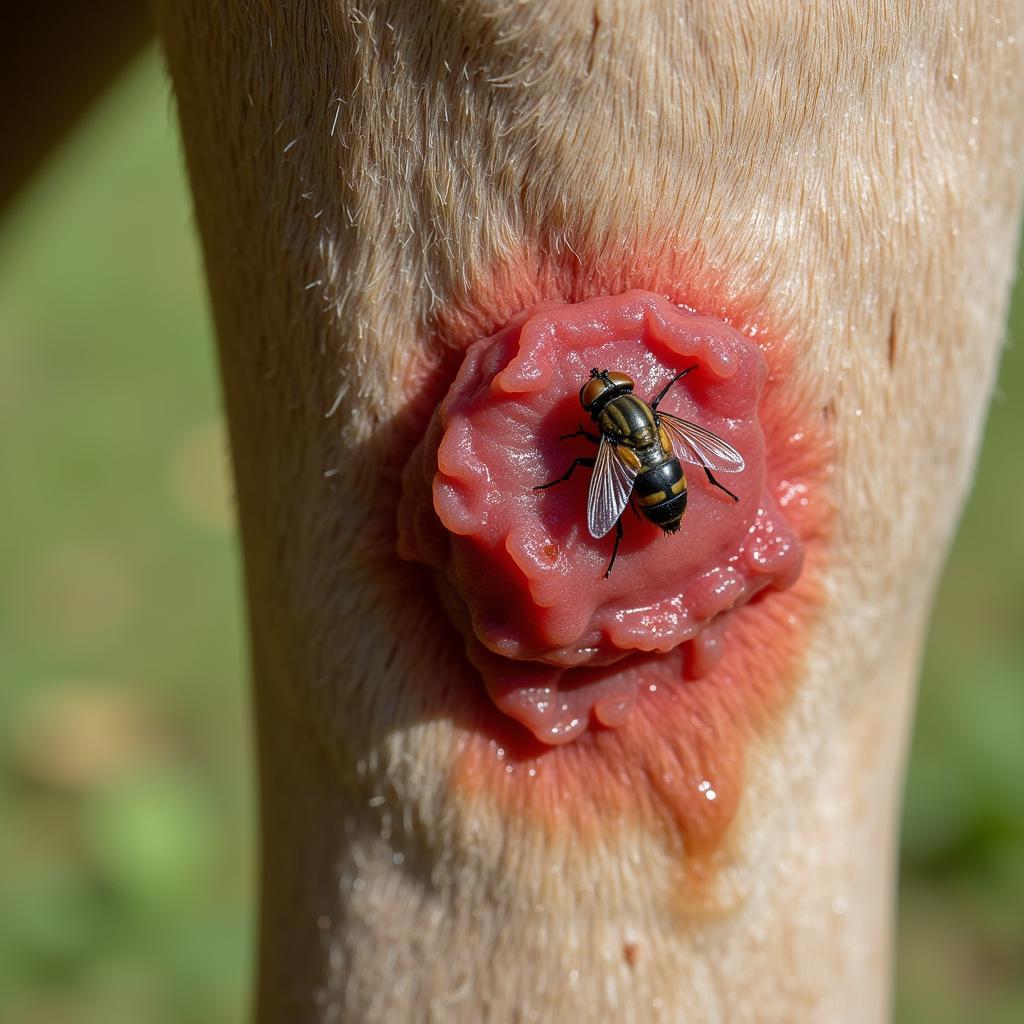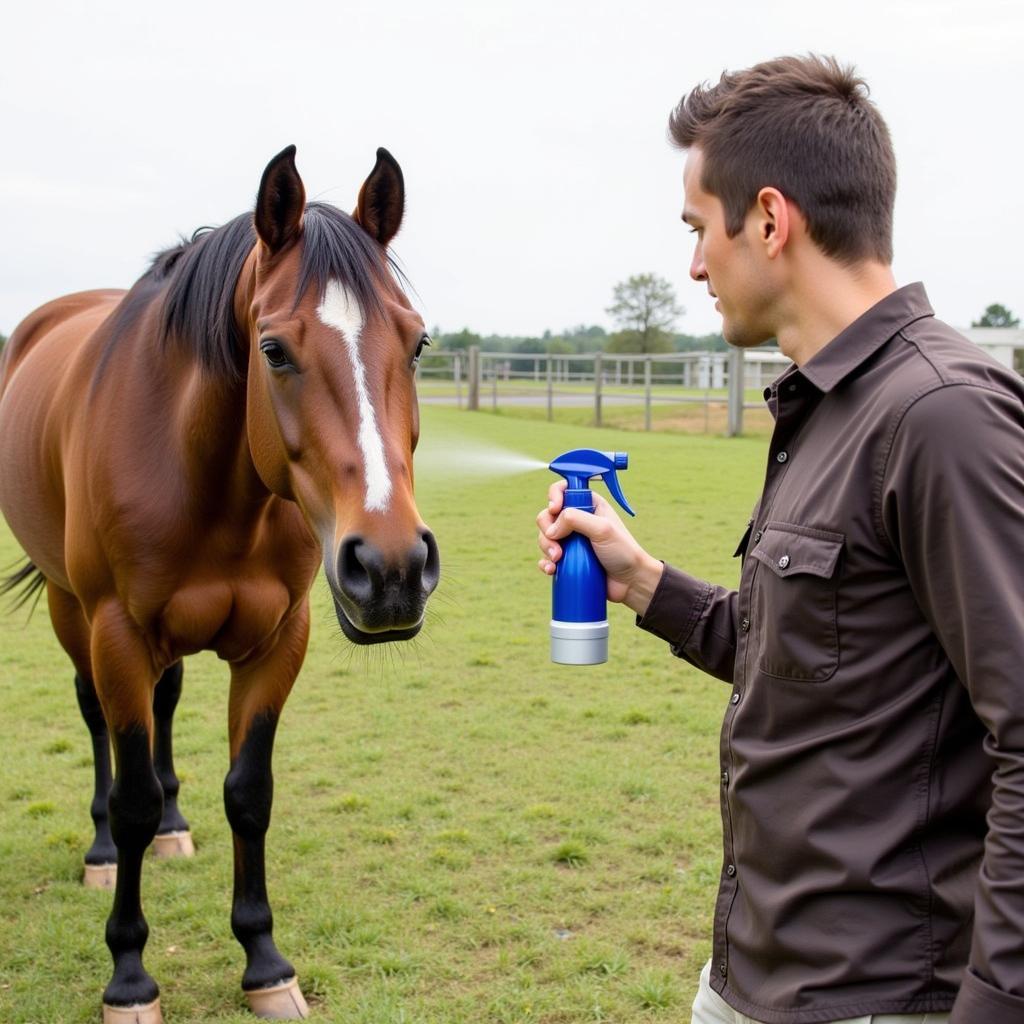For horse owners, especially during warmer months, horse flies can be a real nuisance. These pesky insects can cause significant discomfort to your equine companions, leading to stomping, tail swishing, and even dangerous behaviors if they panic from bites. Thankfully, a multitude of effective horse fly sprays are available to provide relief and protection.
This comprehensive guide will delve into everything you need to know about choosing the right Spray For Horse Flies, ensuring your horse stays comfortable and bite-free.
Understanding Horse Fly Behavior and Risks
Before we dive into specific sprays, it’s crucial to understand why horse flies are so bothersome. Unlike mosquitoes that pierce the skin, horse flies have scissor-like mouthparts that inflict a painful bite. This bite not only causes immediate pain but can also lead to allergic reactions and open wounds, making your horse vulnerable to infections.
 Horse Fly Bite on Horse Leg
Horse Fly Bite on Horse Leg
Key Factors to Consider When Selecting a Horse Fly Spray
With numerous horse fly sprays flooding the market, choosing the most effective one for your horse can feel overwhelming. Here are the essential factors to guide your decision:
1. Active Ingredients: The Heart of the Matter
The effectiveness of any horse fly spray hinges on its active ingredients. Common active ingredients include:
- Pyrethrins and Pyrethroids: These are natural insecticides derived from chrysanthemum flowers. They work by disrupting the nervous system of insects.
- DEET: A synthetic repellent that confuses an insect’s sense of smell, making it harder to locate the horse.
- Permethrin: Another synthetic insecticide that effectively kills flies and ticks on contact. However, use with caution around cats as it can be toxic to them.
- Oil-Based Sprays: These often utilize essential oils like citronella, lemongrass, and eucalyptus, which have insect-repelling properties.
When making your choice, always check if the spray offers protection against other biting insects like mosquitoes, gnats, and ticks for more comprehensive protection.
2. Application Method: Finding the Right Fit
Horse fly sprays come in various application methods, each with its pros and cons:
- Spray Bottles: Convenient for quick touch-ups and targeting specific areas.
- Roll-On Sprays: Offer more precise application, minimizing product waste and reducing the risk of inhalation.
- Wipes: Ideal for sensitive areas like the face and around wounds.
 Applying Horse Fly Spray to a Horse
Applying Horse Fly Spray to a Horse
3. Duration of Protection: Maximizing Time Between Applications
The duration of protection offered by horse fly sprays varies significantly. Some offer a few hours of respite, while others provide up to 14 days of protection. Consider your horse’s lifestyle, exposure to insects, and weather conditions when determining the ideal duration. For instance, a horse constantly exposed to heavily infested areas might benefit from a longer-lasting spray.
4. Safety and Sensitivity: Prioritizing Your Horse’s Well-being
Always prioritize your horse’s safety and comfort:
- Sensitivity: Choose hypoallergenic and fragrance-free formulas for sensitive-skinned horses.
- Wounds: Avoid applying sprays directly on open wounds or irritated skin. Opt for sprays specifically designed for use around wounds. For more information on treating horse wounds, refer to our guide on spray for horse wounds.
- Sun Sensitivity: Some sprays might increase the risk of sunburn. Consider using a fly sheet in conjunction with the spray for added protection.
5. Additional Features: Enhancing Effectiveness and Convenience
- Sweat-Resistance: For horses that sweat excessively, especially during workouts or hot weather, a sweat-resistant formula ensures longer-lasting protection.
- UV Protection: Some sprays offer added UV protection, shielding your horse’s coat from harmful sun rays.
- Pleasant Scent: While functionality remains paramount, opting for a spray with a pleasant scent can make the application process more enjoyable for both you and your horse.
Homemade vs. Commercial Horse Fly Sprays: Weighing Your Options
While numerous effective commercial horse fly sprays are readily available, some horse owners prefer a DIY approach.
Homemade Horse Fly Spray: A Natural Alternative
Homemade sprays often involve natural ingredients like apple cider vinegar, essential oils (citronella, tea tree, lavender), and water. These can be particularly appealing for owners seeking a natural alternative to synthetic chemicals.
However, it’s essential to note that:
- Efficacy: Homemade sprays might not be as potent or long-lasting as their commercial counterparts.
- Consistency: Creating a consistent and effective homemade formula requires careful measuring and mixing.
For a reliable homemade solution, check out our detailed guide on horse fly spray homemade.
Commercial Horse Fly Sprays: Convenience and Reliability
Commercially available sprays offer convenience, reliability, and often a broader spectrum of protection against various biting insects.
Tips for Effective Horse Fly Spray Application
Regardless of your chosen spray, proper application is key to maximizing its effectiveness:
- Cleanliness: Before application, groom your horse to remove any dirt, sweat, or loose hair that could hinder the spray’s effectiveness.
- Even Application: Apply the spray evenly across your horse’s coat, focusing on areas prone to fly bites, such as the legs, belly, chest, and neck.
- Reapplication: Follow the manufacturer’s instructions regarding reapplication frequency. Factors like weather, insect activity, and your horse’s individual needs can influence how often reapplication is necessary.
Beyond Sprays: Integrated Fly Control Strategies
While horse fly sprays play a crucial role in fly control, consider incorporating other preventative measures for a comprehensive approach:
- Stable Management: Regularly clean stalls, dispose of manure properly, and ensure proper ventilation to deter fly breeding.
- Fly Traps and Predators: Strategically placed fly traps and introducing natural fly predators like bats and swallows can significantly reduce fly populations.
- Fly Sheets and Masks: For added protection, especially during peak fly season, use fly sheets and masks to create a physical barrier against biting insects.
Conclusion: Prioritizing Your Horse’s Comfort and Well-being
Choosing the right spray for horse flies is an essential aspect of responsible horse ownership. By understanding the factors involved, you can make informed decisions to ensure your equine companion stays comfortable, healthy, and bite-free, allowing them to enjoy their time outdoors to the fullest.
Remember, if you’re unsure about the right spray for your horse, consult with your veterinarian. They can recommend products based on your horse’s specific needs and any potential sensitivities.
Frequently Asked Questions about Spray for Horse Flies
1. Can I use human insect repellent on my horse?
While it might be tempting, it’s crucial to avoid using human insect repellents on horses. These products often contain ingredients that can be harmful to equines. Always choose sprays specifically formulated for horses.
2. How often should I reapply horse fly spray?
The frequency of reapplication varies depending on the product, the level of insect activity, and environmental factors. Always follow the manufacturer’s instructions on the label.
3. Are there any natural alternatives to commercial horse fly sprays?
Yes, many horse owners use natural repellents like apple cider vinegar, essential oils (citronella, tea tree, lavender), and garlic. However, their effectiveness can vary, and some horses might find the smell unpleasant.
4. Can horse flies transmit diseases?
Yes, horse flies can transmit diseases like equine infectious anemia (EIA) and anthrax. While these diseases are not as common as those spread by mosquitoes, it’s crucial to take preventative measures to minimize the risk of transmission.
5. What should I do if my horse has an allergic reaction to a horse fly spray?
Discontinue use immediately and contact your veterinarian. Symptoms of an allergic reaction might include hives, swelling, difficulty breathing, or lethargy.
Have more questions or need personalized advice? Contact us at Phone Number: 0772127271, Email: [email protected] Or visit our address: QGM2+WX2, Vị Trung, Vị Thuỷ, Hậu Giang, Việt Nam. Our dedicated customer support team is available 24/7 to assist you.
Looking for other helpful tips for your horse’s health and well-being? Check out our articles on garlic powder for horses and swat ointment for horses.